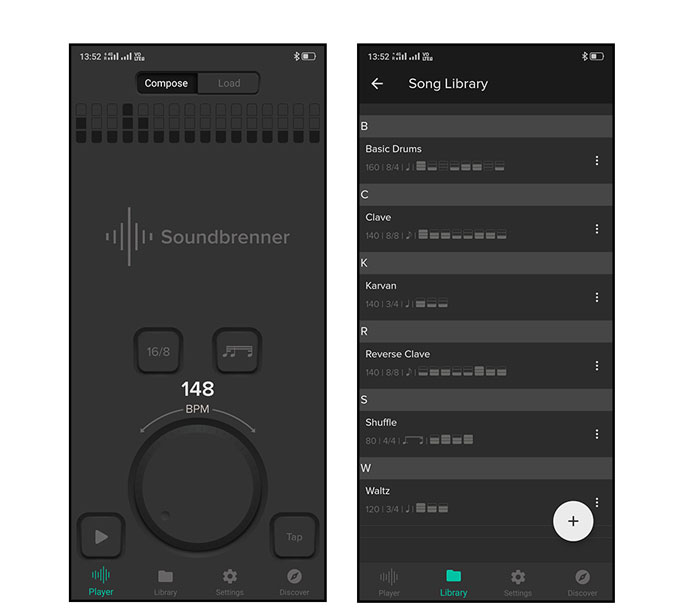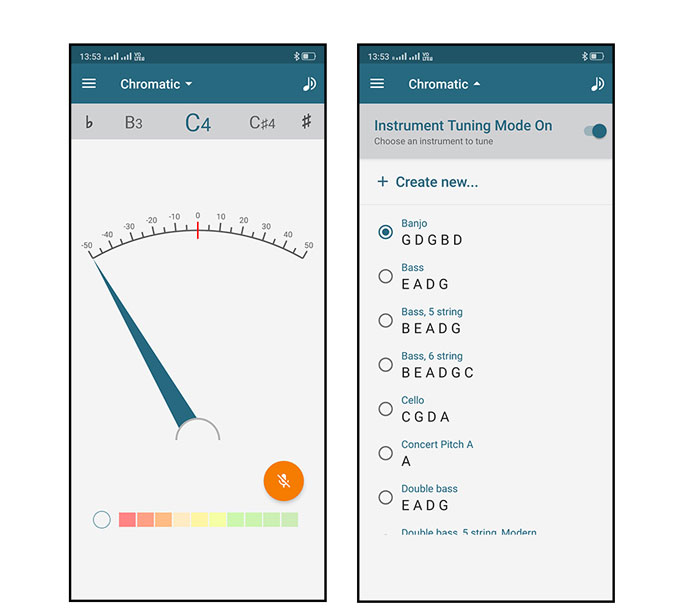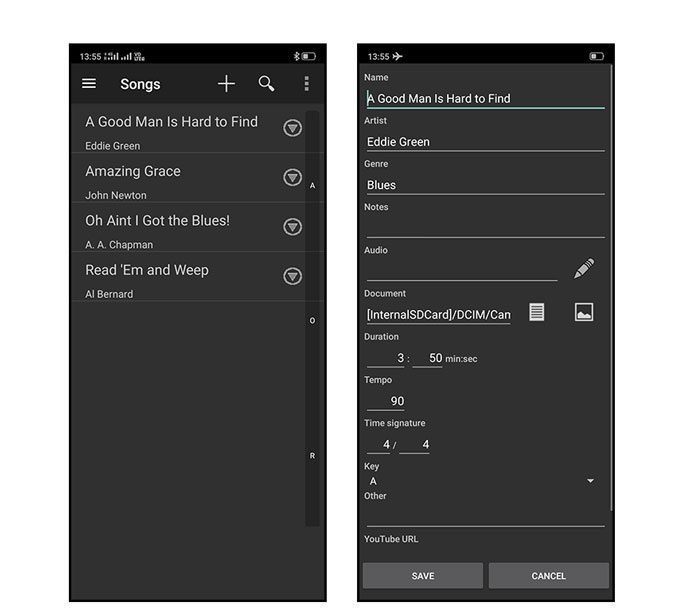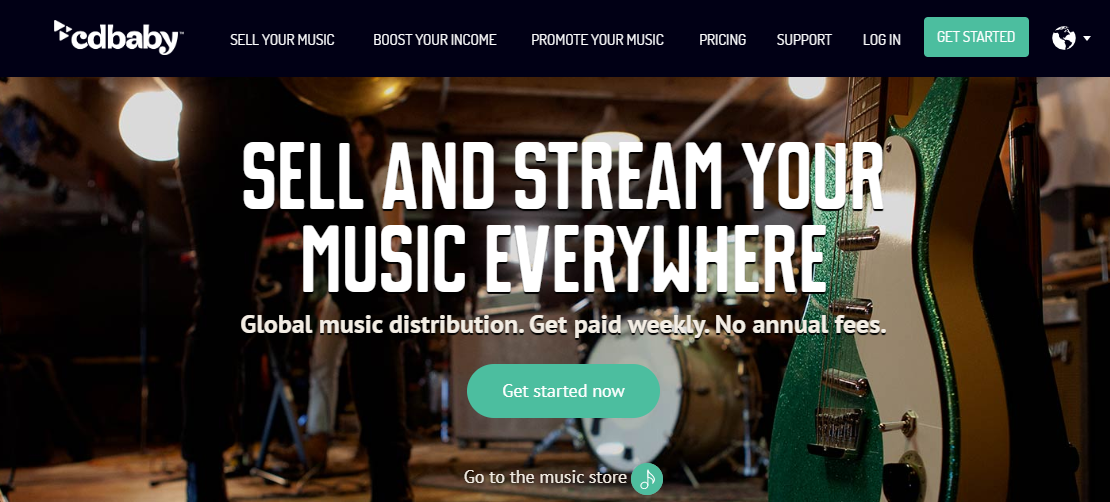Every language has rules that bind everything together and gives a standard way to communicate, for example, you’re bound by the rules of grammar when you’re communicating in English. Similarly, when two musicians play together they’re bound by the rules of music, i.e, playing in a certain key, in a similar tempo and hence, providing a base to collaborate and improvise together.
To get better with these underlying rules, tools like the metronome, tuner, apps for ear training become an indispensable part of a musician’s daily life. So let’s dive right into it, here are some must-have apps for every musician.
Table of Contents
Best Apps for Musician
1. The Metronome by Soundbrenner
Whether you’re a single act or you’re playing with other musicians, one underlying common factor that helps everyone play together is the rhythm. So, to maintain the same rhythm, a tool that not only helps you play with others but assist you while you’re practicing alone as well is important. Hence, making the metronome the most important tool regardless of the instrument you play.

Soundbrenner already offers a watch integrated with a metronome but there is an app as well, which can be used independently. The interface is pretty basic which makes it easy to understand. There’s a metronome in the player section with a dial to set the tempo, which can range from 20 to 400 BPM. In case you feel like changing the time signature, there are plenty of options to choose from. In addition to that, you can also tweak the subdivision of notes.
The option to tap the tempo makes it easy when you’ve instantly set a tempo. Although there are options to change the metronome sound and the ability to count in, you can’t set more than one-time signature, limiting its own ability.
Salient Feature
Setlist: You can create a setlist for all the songs you play frequently, eliminating the need to manually put it. With the default setting, you have the dark UI but you have the option to enable the light theme as well. You can also connect it to Ableton using a local server through the Ableton link feature. The app doesn’t have any adds making it a great app choice.
2. Pitched Tuner
A musician should always have a tuned instrument, else it sounds out of pitch, might sound extremely low or too high. Whatever the reason may be, it restricts you from playing the right notes and also if you’re playing with others, you’ll be the red herring. While you can carry a tuning fork with you, using your phone as a tuner comes in handy at all times.

Pitched Tuner is a chromatic tuner app. It has two tuning modes, chromatic and instrument. If you play a specific instrument, let’s say the Ukulele, it’ll show you just the target notes so you don’t have to bother with others. If you’re a beginner this might be very helpful for you. You can alternatively use the chromatic tuner if you are familiar with the correct tuning. You can customize it further by adjusting the sensitivity of the volume, set tuning for instruments which aren’t there in the list as well as the option to switch to dark mode. This app is free to download therefore there are adverts in the app, but they’re very minimal.
3. Perfect Ear
Notes are your guide to music. The more you practice the more you get used to them. As these notes are standard in any form of music, the ability to identify them helps you improvise and make music more effectively. So ear training is like an assistant that is always in the background but a major factor in any musician’s growth. Moreover, you get familiar with the fundamentals skills like chords, intervals, scales, etc.

The app is divided into three training sections,i.e, interval, scale, and chord exercises. The first being interval training, consisting of basic theory a musician should know, interval identification and comparison. You can also sing and practice intervals and make your custom practices. The same practice options are available for the other two with the focus on scales and chord exercises.
We’ve already discussed metronome but if you want to get better with the rhythm, this app has a dedicated rhythm training section as well. Other extra features like sight-reading, the circle of fifths, a fretboard trainer for guitarists make it a huge repository of lessons.
In case you want to track your progress (believe me that helps), a section showing personal scores and achievements helps you know at what pace your learning is and adjust the practice accordingly.
Get Perfect Ear on Android and iOS
4. Soundcloud
You can possibly have a dozen songs lying around in your storage but what’s the use of the effort if no-one is there to listen?
Enter Soundcloud. Founded in 2007, it still remains the go-to platform for budding musicians to upload music. It lets you listen to new music and also upload tracks.

You can connect with other musicians, comment and share the tracks that you like. You also get a stats page, which helps you judge your growth in terms of likes, comments, reposts, and downloads. The free version allows you to upload 180 minutes of music but you can subscribe and extend it to unlimited minutes. Soundcloud also has go and go+ subscription which allows offline listening and no ads.
- WAV, FLAC, AIFF, ALAC, OGG, MP2, MP3, AAC, AMR, and WMA
Get SoundCloud on Android and iOS
5. Set List Helper
Set List Helper helps you to remember lyrics or chart out a chronological order to perform songs, so you don’t have to worry about carrying a notebook with you.

With a setlist helper, you can create a chronology of songs to be performed. There is a sync feature as well, which allows both the app and the website to be in sync. For those who perform with multiple bands, you can easily create multiple setlists and even add the gig location, date and time. There is a separate section for songs as well, where you can add the artist’s details, genre, duration of the song and the time signature. Although the free version offers most of what a musician would need, features like auto-scroll, sharing setlist over e-mail and Facebook, ad removal are features that you can purchase.
Get Setlist Helper on Android and iOS
6. CD Baby
You’ve several options to release music when you’re done producing your track. While record labels have become hard to approach, releasing it on digital platforms like Apple Music, Spotify, etc, makes more sense. This is where the need for a distribution platform comes into play.

CD Baby is one of the oldest in the game and started as an online CD store. Bon Iver, Twenty One Pilots are some of the many artists who’ve used their service. It supports digital distribution to 150 online streaming platforms including Apple Music, Spotify, Amazon Music, etc. It not only posts your music but also gets you instant verification of an artist’s account. So essentially you can upload music for a specific fee, either for a track or for an album. CD Baby also lets you monetize your music so, if you’ve plenty of new tracks. Upload and get paid!
If you want to release a single, the standard pack comes at $9.95 and $29 for an entire album.
Visit CD Baby here.
8. Backtrackit: Musicians’ Player
Just like a good writer is a good reader, a good musician listens to a lot of music. The difference is, they might listen in such a way, dissecting every note and rhythm and understanding it. For that, you need a music player that not only is a music player but adds features like transposing, looping and tweaking the EQ. Backtrack is an app, that fits in the category.

In terms of being different from other music apps, you can detect the key of any track and transpose it. If you want to practice, you can find backing tracks with live chord progression with a graphical representation of a fretboard or a piano. It also has inbuilt tools for musicians like metronome, circle of fifths, scales, chords, etc. You can sort your songs according to the key. It also detects songs in your local library. It detects the key and tempo and also shows chords and scales for the song. Overall, it not only lets you listen but grow as a musician with all these tools.
Get Backtrackit on Android and iOS
Remarks
Whether it’s being in rhythm or in tune. These tools are useful for every musician. Nevertheless, you can carry a pitch pipe, a tuner, and even a physical metronome but when you can do all of that with just the phone, I hardly see a reason to not use it. Besides creating music, other tools like Soundcloud and CD Baby, help you push your music to multiple platforms. Use of Setlist and a music player dedicated to musicians help you grow as an artist.
You can record music in a studio or a recorder app on your phone, choose a DAW, buy the instrument you like, be it a string instrument like the Ukulele or a keyboard, these are few things that are useful to all regardless of the genre you’re in.
So, I tried to portray a complete list of must-have apps for musicians. Do you’ve more? Comment below.